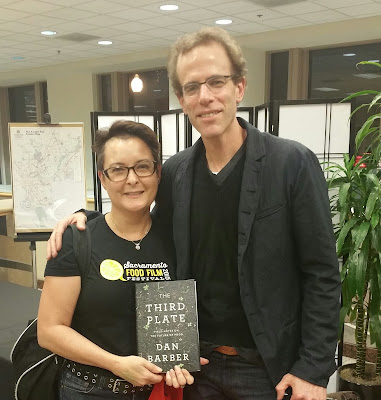I am not interested in eating insects. Oh, I know they are the next big food thing, but count me out on that one. It gives me the heeby jeebies. Yet I inadvertently ate some the other night.
I was at the Fruit to Root party, put on by the Food Literacy Center, that preceded the Dan Barber speech at the Central Library Galleria. A dozen of Sacramento's chefs were all presenting bites a la Wasted, Barber's New York pop-up restaurant that serves only dishes made from parts that we normally throw away. This list includes offal from animals as well as things like carrot tops, peels, and seeds that are normally tossed from plants.
 |
| Fox40's Bethany Crouch trying the arepa |
There were some pretty impressive bites, including the arepa that was made with meal worm flour mixed with maize flour, thus the insects. At least I couldn't see them. All joking aside, all of them were creative and delicious. (Scroll to the bottom to see some of the dishes).
Of course the star of the evening was Dan Barber, James Beard Award winning chef and the author of The Third Plate. Now in all honesty, I knew I wouldn't be able to read that book, so I opted for the audiobook, which he reads. He apologized for his boring voice, but actually, it's quite enjoyable as an audiobook because it's like he's telling you stories of his trips and discussions with people. It's more personal.
What I love about the book is that he shares his insights in what is wrong with the farm to fork movement, his journey to his conclusions, and the way it wakes you up to a new way of thinking about where our food comes from. There are many topics/chapters in the book that all relate to the overall message of how we need to change how we look at farming and food.
Barber was also gracious enough to say that Sacramento has an important part to play as we are the Farm to Fork Capital.
Making me wonder...
Barber talked about the importance that chefs can play in educating and changing the way we eat. He also explained how, when he made his changes to serving dishes with rotational crops and lesser known ingredients, he switched to a prix fixe menu. Prix fixe menus mean that you eat what the chef decides instead of choosing off a menu. So, in his case, you were eating offal and rotation risotto (risotto made with other grains such as barley and millet) whether you wanted to or not.
I've also been watching Chef's Table on Netflix. There's actually a great episode with Barber, but the one I'm thinking about now is the episode with New Zealand chef Ben Shewry. In it he talks about how every Tuesday is their experimental night. Guests know it and they pay for a prix fixe menu of a meal where anything goes. It could be good, or some dishes can fail.
So all this makes me wonder... what if a restaurant here took the same approach with a creative menu using waste? Have a night where everything is helping to educate people and getting used to eating in a way that is better for farming and the environment.
Thing is, Sacramento isn't exactly a prix fixe town. The only restaurant that solely works on a prix fixe basis is The Kitchen. All other restaurants that have prix fixe menus also allow off-menu ordering. My cynical thinking is that if people have a choice, they'll opt for their familiar favorites over trying something adventurous, so I'm concerned it will only work by limiting to prix fixe menu only. But then will there be enough interest/orders/sales?
I'd love Sacramento to prove me wrong. I'd love us to be like Barber said, a leader in the movement to TRUE sustainable farm to fork dining. Can we make it happen?
 |
| Braised lamb neck |
 |
| Whole grain risotto, smoked eggplant, goat milk feta |
 |
| Winter squash guacamole |
 |
| Crackers of sprouted buckweat, bruised apple butter, chicken innards mousse |




